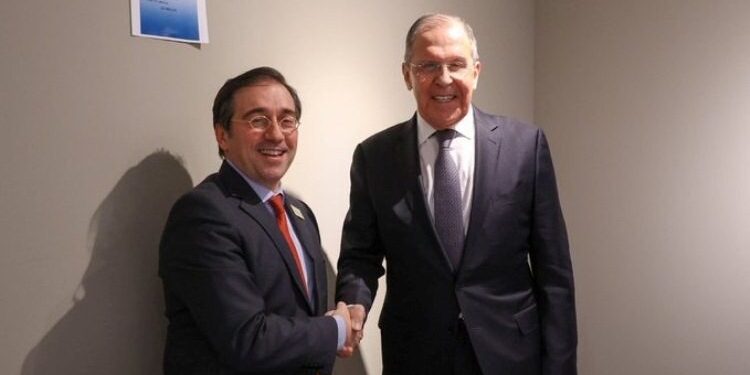Eduardo González
The Minister of Foreign Affairs, José Manuel Albares, will participate this week in a new G20 ministerial meeting, to be held on March 1 and 2 in New Delhi (India) and in which, as in the previous ministerial in July 2022 (held in Bali, Indonesia), he will again coincide with his Russian counterpart, Serguei Lavrov, a few days after the first anniversary of the Russian invasion of Ukraine.
According to the Russian Foreign Ministry spokeswoman, Maria Zakharova, Lavrov will participate in the meeting and will hold a dense agenda of bilateral meetings with his counterparts from China, Brazil and India. During her announcement, reported by the Russian media, the spokeswoman stated that the ministerial meeting is a “key forum for global governance”, organized by the Indian Presidency in a “unifying” spirit, and will serve to address issues such as “capacity building, reform of international institutions to strengthen the position of states in collective decision-making”, energy, food security or the fight against terrorism.
Albares already coincided with his Russian counterpart during the ministerial meeting organized by Indonesia in July last year, a few months after the beginning of the invasion of Ukraine. On that occasion, as the minister explained, although there was “a confrontation of opinions”, the “majority of G20 members” expressed their “rejection of the Russian aggression against Ukraine and the need to return to international legality”. Lavrov, on the other hand, only came to “leave his message and leave,” with a speech to the rest of his G20 counterparts that “had, of course, no basis with the reality of what is happening.”
Last November, the G20 Summit held in Bali (attended by the President of the Government, Pedro Sánchez, and in which Russia was also represented by Serguei Lavrov) adopted a Joint Declaration that deplored “in the strongest terms the aggression of the Russian Federation against Ukraine” and demanded “its complete and unconditional withdrawal from the territory of Ukraine.”
“Most members have strongly condemned the war in Ukraine and stressed that it is causing immense human suffering and exacerbating existing fragilities in the global economy, limiting growth, increasing inflation, disrupting supply chains, increasing energy and food insecurity and raising risks to financial stability,” the text continued. “There have been other views and different assessments of the situation and sanctions,” the statement admits. At that meeting, all countries, including Russia, called the “use of nuclear weapons or even the threat to use them” “inadmissible.”
India and China
India, the host of the meeting, abstained last week at the UN General Assembly (held in New York as part of the Special Session on Ukraine) from voting on a resolution calling for an “end to hostilities in Ukraine” and the withdrawal of Russian troops. Following the vote, in which there were 141 votes in favor, Ukrainian Foreign Minister Dmytro Kuleba called on India to take greater leadership within the G20 and warned that “neutrality and balance are not the way to peace.”
During last year’s ministerial in Bali, Albares met with his Chinese counterpart, Wang Yi, whom he asked for “his active collaboration to put an end to the war in Ukraine”. Wang Yi was precisely one of the few ministers who met with Lavrov in Bali and who will do so at this new meeting in New Delhi.
Precisely, the new meeting comes after Wang Yi presented last week to Kuleba, during the Security Conference in Munich (Germany), a plan to end the war in Ukraine. In this regard, the President of Ukraine, Volodimir Zelenski, declared last Thursday during a joint press conference in Kyiv with Pedro Sanchez that he thought it was “positive” that China had proposed a peace plan, although he stated that it was too early to “analyze it” and that his government will draw conclusions when it knows “the details”.
China also abstained in the UN vote. Last Friday, Albares declared in New York, after participating in the General Assembly and before attending a Security Council meeting dedicated to Ukraine, that China “is a world power” and is “fundamental (…) to bring peace to Ukraine” and, therefore, should “fully” play its role as a permanent member of the Security Council and use “its ascendancy and its good connection with (Russian President Vladimir) Putin to stop this illegal and unjust war and for peace to return to Ukraine and Europe as soon as possible”.





